Steven Pressfield's Blog, page 35
May 20, 2020
The Villain Believes in the Mean Streets
[Continuing our series on Bad Guys in film and fiction … ]
The villain believes in a world of scarce resources and a competition of all against all.
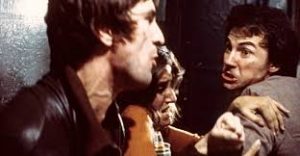
Robert De Niro and Harvey Keitel in Martin Scorsese’s “Mean Streets” (1973)
As the villain sees it, the human race inhabits a post-Edenic cosmos, i.e. a universe in which all of us have been kicked out of the Garden (where our needs were provided for in abundance) and are condemned for ever after to scuffle for a living out here on the mean streets. Or, as the tribesmen of Pashtunistan might phrase it,
I against my brother; my brother and I against our cousin; my brother, my cousin and I against the world.
Or, phrased another way,
And unto Adam He said, Because thou hast hearkened unto the voice of thy wife, and hast eaten of the tree, of which I commanded thee, saying, Thou shalt not eat of it: cursed is the ground for thy sake; in sorrow shalt thou eat of it all the days of thy life; Thorns also and thistles shall it bring forth to thee; and thou shalt eat the herb of the field; In the sweat of thy face shalt thou eat bread, till thou return unto the ground; for out of it wast thou taken: for dust thou art, and unto dust shalt thou return.
The patron saint of the Villain point of view is Thomas Hobbes, the great English philosopher and author of Leviathan (1651), in which he laid out the proposition that all men are born selfish/evil and care for nothing but their own preservation and advancement. He termed this condition the “state of nature.”
In such condition, there is no place for industry; because the fruit thereof is uncertain: and consequently no culture of the earth; no navigation, nor use of the commodities that may be imported by sea; no commodious building; no instruments of moving, and removing, such things as require much force; no knowledge of the face of the earth; no account of time; no arts; no letters; no society; and which is worst of all, continual fear, and danger of violent death; and the life of man, solitary, poor, nasty, brutish, and short.
Hobbes believed that the only viable form of government was monarchy. The human race in his view was incapable of governing itself, i.e. practicing democracy, because each individual under pressure would revert to seeking his own self-interested ends or would bond inevitably with other like-minded partisans (see “political parties”) and act in the same selfish/evil manner, only collectively.
It must be said, though I hate to be the one to say it, that Hobbes has a point.
Indeed most villains have a point.
The tyrant or despot, in his or her own mind, is not operating out of greed or lust for power or the desire to crush his or her enemies. Rather he or she is acting—in his or her own view, that is—as any prudent, responsible person would act, given the fact that the human race is evil and, if society is to avert catastrophe, cannot be permitted to act out of its own blind, self-interested instincts.
When we write our own villains, it’s important to keep this in mind. The Bad Guy, in his own view, is not bad. He’s just being “realistic.”
May 13, 2020
The Female in “Lawrence of Arabia”
With the exception of a few long-distance glimpses of tribal Arab wives and mothers ululating in valediction as their husbands and sons ride off to war (and a quick peek or two at be-jeweled feminine hands extending from beneath side-curtains in camel-borne covered conveyances), there are no female characters in Lawrence of Arabia.
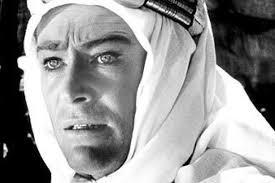
Peter O’Toole as T.E. Lawrence in “Lawrence of Arabia”
Or are there?
I would make the case that the female in Lawrence is the desert. As we wrote in an earlier “Female Carries the Mystery” post:
The desert is remote and mysterious. It is timeless, eternal. In the world of the Bedouin the desert is the source of all life. The desert vistas in “Lawrence” are gorgeous, mesmerizing, awe-inspiring. Clearly Lawrence himself falls utterly in love with these vast, enigmatic, ultimately unknowable expanses.
It’s the desert herself that “carries the mystery” in Lawrence of Arabia.
Remember our second axiom concerning the “female” and the “mystery”:
The male seeks to uncover the mystery.
Lawrence is the “male” in Lawrence of Arabia. The desert has bewitched him from before he has even ventured into it.
DRYDEN (CLAUDE RAINS)
Only two types of creatures get fun in the desert—Bedouins and gods, and you’re neither. Take it from me, for most men it’s a burning, fiery furnace.
LAWRENCE (PETER O’TOOLE)
No, Dryden, it’s going to be fun.
Upon first encountering Lawrence and hearing him defy his superior officer, Colonel Brighton (Anthony Quayle) to take a stand favoring the Arabs over the British, the keen and discerning Prince Feisal (Alec Guinness) peers deeply into Lawrence’s eyes, seeking to understand this young officer’s motivation.
PRINCE FEISAL
I think you are one of these desert-loving English … Doughty, Stanhope, Gordon of Khartoum. No Arab loves the desert. We love water and green trees. There is nothing in the desert. No one needs nothing. Or is it that you think we are something you can play with, because [quoting something Lawrence himself spoke earlier, in anger, to another Arab prince] we are ‘a little people, a silly people … greedy, barbarous, and cruel’?
The critical distinction made by Feisal in this passage is that between how her own people, the Bedouin Arabs, perceive the desert and how a European foreigner might perceive it.

Alec Guinness as Prince Feisal
Lawrence sees the desert as the ground of the mystery.
But what exactly is this mystery? What is the desert to Lawrence?
For one thing, it is an arena for his boundless ambition.
LAWRENCE
(to Feisal)
My lord, I think your book [the Koran] is right. ‘The desert is an ocean in which no oar is dipped.’ And on this ocean, the Bedu go where they please and strike where they please. This is the way the Bedu have always fought. You’re famed throughout the world for fighting in this way and this is the way you should fight now!
FEISAL
And are you loyal, then, to England?
LAWRENCE
To England. And to other things.
What other things? Justice? Freedom? The chance to free an entire people? To act with power upon a stage worthy of the great warriors of earlier eras—Alexander, Caesar, Napoleon?
Even after multiple seasons of bitter, bloody fighting, Lawrence remains smitten by this female. In one interlude of peace, Chicago journalist Jackson Bentley (Arthur Kennedy, based upon the real-life Lowell Thomas) questions our protagonist.
JACKSON BENTLEY
What is it, Major Lawrence, that attracts you personally to the desert?
LAWRENCE
It’s clean.
[Bentley chuckles and shakes his head.]
LAWRENCE
Clean.
BENTLEY
Well, now, that’s a very illuminating answer.
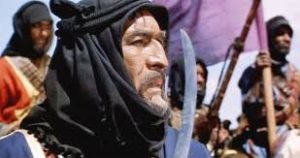
Anthony Quinn as Auda abu Tayi
But the desert, Lawrence finds over the course of yet more brutal campaigns, cannot be manipulated or overcome or used for petty human purposes. It remains mute, pitiless, unconquerable, and unknowable.
AUDA ABU TAYI (ANTHONY QUINN)
The desert has dried up more blood than you can think of.
In the end, when the Arab armies led by Lawrence have captured the enemy stronghold of Damascus (and in essence have defeated the Axis foe, Turkey, in the Middle East theater of WWI), the victory proves hollow as the generals and politicians snatch it from the hands of the warriors who have won it.
LAWRENCE
I pray that I may never see the desert again. Hear me, God.
[But Lawrence’s friend Auda knows him better than he knows himself.]
AUDA ABU TAYI
For you there is only the desert.
Lawrence’s death on a speeding motorcycle—the opening sequence of the movie—comes seventeen years later in England, leaving us in the audience to suspect (as the filmmakers have of course led us to) that, in the deepest sense, our protagonist has willed his own end (or certainly has done nothing to resist it) out of the loss of, and ultimate estrangement from, the one great love of his life.
The desert carries the mystery in Lawrence of Arabia.
May 6, 2020
Winning the First Battle in the Lifelong War of Art
Click here to get your Advanced Reader’s Copy of The Sand Sea.
A true story from the writing trenches:
About ten years ago I was at a party at my new friend Mike McClellan’s parents’ house. Sometime during the evening Mike tugged me aside and told me he had an idea for a book that he wanted me to write. He had read Gates of Fire and he thought I had the gift for an epic, larger-than-life, historical saga.
Mike proceeded to tell me the story of The River War by Winston Churchill, a monumental tale of the Brits in the Sudan in the late 1800s, when Churchill was a young lieutenant at the battle of Omdurman. Mike was on fire with this story. As he described the arena and the characters and the politics, I had to stop him.
“Mike,” I said, “It’s not me who should write this book. It’s you.”
Short version: Mike did write it, and it came out freakin’ GREAT. Seven hundred and sixty-two pages of high adventure and romance. But here’s the really interesting thing that all of us as writers can relate to. About a year into the writing, Mike found the book morphing into something he hadn’t planned or even imagined.
The story was transforming itself from a straight historical saga to something more like Game of Thrones. In place of real geographic settings, Mike found himself inventing whole oceans and continents. His true historical characters became fictional creations. (And here’s another aspect we’ll all be able to identify with … Mike wrote two hours each morning, never missing a day, while living his real life as a lawyer, husband, and father of two young daughters.) The result is The Sand Sea. It’s exactly the kind of book I love, where the author fashions an entire universe and then sweeps you away into it.
I will say no more, as I don’t want to be guilty of hype. Except click on the link above for the full story on how to get a free eBook advance copy of The Sand Sea.
P.S. If you ever find yourself wanting another writer to write a book you feel burning in your guts, stop yourself and take a deep breath. Then write that book yourself.
April 29, 2020
Getting Ready for Tomorrow
The last thing I do before closing my eyes to sleep is to mentally prepare myself for the fight tomorrow.
How easy it is, congratulating yourself after a productive today, to talk yourself into slacking off tomorrow.
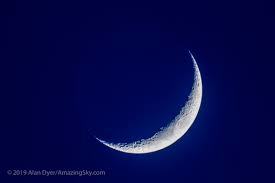
The working day doesn’t start in the morning. It starts the night before.
The first post in this series was titled RESISTANCE WAKES UP WITH ME.
It does, and I know it.
Resistance will hit me tomorrow morning before I even open my eyes. It will try to turn my success today into failure tomorrow.
Resistance will try to convince me I can relax, ease up. “You put a good day in the bank today. Enjoy it. Slack off a little tomorrow.”
Tempting, ain’t it?
But I know what will happen if I listen to this siren song.
So I don’t listen.
Instead I steel myself. Like an athlete, like a provider for a family, like a contender, like a professional.
I am playing the long game.
I am inculcating habit.
I am deepening my practice, day by day.
I have a month-at-a-glance calendar on my desk. Every day when I finish work, I write a letter as a code for the project I worked on that day in the upper right hand corner of the calendar day … and I put a check mark beside it.
What I’m trying to do is reinforce for myself the idea that my artist’s life is 24/7/365.
I want to be able to look down at that calendar and see check mark after check mark with no gaps in between.
I’m my own boss, my own coach, my own CEO.
I’m training myself and reinforcing myself every day.
April 22, 2020
How the Spartans Would Fight COVID-19
A (true) question from antiquity:
Why do the Spartans punish with a fine a warrior who loses his helmet or breastplate in combat but punish with death the man who discards his shield?
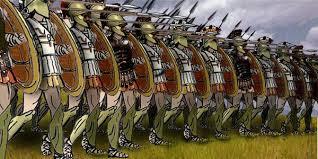 ” … for the protection of the whole line.”
” … for the protection of the whole line.”The true answer, from Plutarch:
Because helmet and breastplate are worn to protect the individual alone but the shield is borne to protect the whole line.
In ancient phalanx-type warfare, the formation advanced upon
the enemy with shields overlapping, so that one warrior’s shield protected
himself and, partially, the man next to him. The aim was to present to the foe
an unbroken, impregnable front of armor.
The enemy’s objective of course was to break through this
front, to create a breach into which his forces could flow. One failed shield
and the whole army could be lost.
Now a question from the war you and I are fighting today:
Why are we asked to wear surgical or face masks in public, to practice social distancing, and to observe self-quarantining?
Answer:
Because these practices are not for the individual alone but for the protection of the whole line.
In recent days we’ve seen protesters in Michigan and other states demonstrating their resistance to such public health directives. They carry signs saying I WILL NOT COMPLY and DON’T TREAD ON ME. The demonstrators take offense at such communal safety measures, characterizing them as “government overreach.” They declare that such mandates violate their personal freedom.
Two more questions:
Would we accuse the ancient Spartans of “government overreach” if they mandated that each warrior, facing the enemy, hold his shield before him and not abandon it and run away?
Suppose one warrior did cast away his shield and flee, thus opening a breach in the phalanx’s front? Would the Spartans excuse him if he explained that he took such action as an exercise of his “personal freedom?”
Steven Pressfield is
the author of “Gates of Fire,” a novel about the 300 Spartans at the battle
of Thermopylae. In 2006 he was made an honorary citizen of the city of Sparta
in Greece.
April 15, 2020
One Word and Done
I did an Instagram “live” a few days ago with the thriller writer Jack Carr. Do you know him? He’s a former Navy SEAL sniper and task force commander, who is a natural-born teller of ripping yarns that grow out of his own experience in the hot political and military spots around the globe.
We
were talking about writing and Jack shared a one-word trick that that I had
never thought of before.
I’ve
adopted his practice now completely.
We
were talking about theme. Jack was citing something I had said on a Joe Rogan
podcast a few years ago that, Jack said, had helped him tremendously on his
first three novels.
What
I said was this:
I was quoting Robert McKee who, as a young theater director, once got to interview Paddy Chayefsky, the great playwright and novelist and the only three-time solo Oscar winner for original and adapted screenplays (for Marty, The Hospital, and Network.)
Chayefsky told Robert McKee, “As soon as I figure out the theme of my play, I type it out in a single line and Scotch-tape it to the front of my typewriter. After that, nothing goes onto the page that isn’t on-theme.”
As
soon as I heard that from McKee I incorporated it into my own writing practice.
(Only then it was onto my computer screen instead of a typewriter.)
Now:
Here’s
the twist Jack Carr puts on this idea. He doesn’t write out a multi-word theme
statement, like “The rich get away with murder” or “A
character’s past catches up with her, no matter how far or hard she flees from
it.”
Jack
boils it down to one word.
‘Revenge.’ If that’s my theme word, I write it on a Post-it and stick it in the upper right hand corner of my screen. Or ‘Redemption,’ say. Or ‘Love.’
I
immediately decided to do that myself from now on.
Of
course in my head I will know the fuller version. ‘Revenge is a dish better
served cold’ or whatever I’ve decided my theme is.
But
I love the concision and simplicity of a one-word statement.
If
you and I are writing The Godfather, for
example, our Post-it might say:
Family.
If
we’re writing The Bridge on the River Kwai, it could be:
Madness.
(That
word would work pretty well for Moby
Dick, Apocalypse Now, Full Metal
Jacket and many others.)
So
… thanks to Paddy Chayefsky and Robert McKee and Jack Carr!
P.S.
At the risk of flogging a friend’s stuff, Jack Carr’s third thriller, Savage Son, just came out. If you like
military/hardware/political thrillers, this is textbook,
break-it-down-and-study-it, state-of-the-art work. Five stars from a new and
rising star in this genre who, I’ve got a feeling, is going to be evolving way,
way beyond it.
April 8, 2020
The Goddess Visits at Night
I’m not joking when I say I do some of my best work in bed. In the middle of the night.
Something about that twilight stage of consciousness when we’re not awake but not asleep either.

My trusty Olympus recorder. I never go anywhere without it.
Why do ideas come to us in the shower, or where we’re shaving or driving on the freeway and hanging onto a strap in the subway? Those too are twilight states. They are “gateway stages” when the membrane is down and insights can bubble up from the Muse’s secret sanctuary.
The ego, I believe, is the generator of Resistance. So when the ego is even momentarily in a state of drowsiness (or full-on conked-out-ness), it gives the deeper Self an opening to break through into our awareness.
All this is a long way of saying
Keep a notepad or a tape recorder beside your bed.
Or better yet
Keep some means of recording your thoughts with you at all times.
The goddess visits at night.
April 1, 2020
Churchill’s “K.B.O.” (Or something like that.)
There’s a skill that you and I as long-form writers have had
to develop that will serve us (and everyone else) very well in this “time
of cholera.” I’m not sure this virtue even has a name.
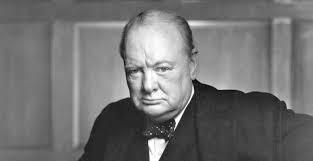 “Remember our motto: ‘K.B.O.’ Keep Buggering On.”
“Remember our motto: ‘K.B.O.’ Keep Buggering On.” It’s
a little like Winston Churchill’s K.B.O. “Keep Buggering On.”
Which
itself is kinda like the famous sign from the tube-station air raid shelters
during the Blitz, Keep Calm and Carry On.
I’m
reminded as well of John Keats’ concept of “negative capability.”
Have you heard of this? It’s from a letter from Keats to his brother in 1817:
“I had not a dispute but a disquisition with Dilke, upon various subjects; several things dove-tailed in my mind, and at once it struck me what quality went to form a Man of Achievement, especially in Literature, and which Shakespeare possessed so enormously—I mean Negative Capability, that is, when a man is capable of being in uncertainties, mysteries, doubts, without any irritable reaching after fact and reason … ‘
But
it’s not exactly that either. It’s closer to Krishna’s admonishment to Arjuna
in the Bhagavad-Gita that we mortals
…
have a right to our labors, but not to the fruits of our labors.
Lemme
try to define this virtue straight out.
It’s the ability to keep on working with undiminished focus and effort even when we believe (or at least strongly suspect) that there will be no external reward or recognition at the finish.
In
other words, the act of performing a function for its own sake entirely.
This
is a soldier’s skill, and a mother’s. It’s a nurse’s skill. It’s a physician’s.
In many ways it’s a teacher’s skill.
For
sure it’s a writer’s virtue, and an artist’s of any kind, and an
entrepreneur’s.
Whatever
we call it (and I still don’t have a word), it’s a virtue we all need now.
We
cannot predicate our actions today upon any outcome we can count on tomorrow.
Nobody knows. Nobody can predict. Anybody who claims he can is either lying or
self-deluded or both.
Yet
we have to keep doing what we’re doing, and we have to keep doing it at a high
level of commitment and fidelity.
What
makes it so challenging is that human nature was not built to operate this way.
We were made in times of peril to close ranks, to take up our posts shoulder to
shoulder.
That
won’t work today.
We
have to, now, maintain solidarity with our brothers and sisters in a crazy,
solitary, self-distancing way. We’re forced in our day-to-day lives to operate inside
our own heads, to define our goals entirely by our own criteria (which may be
very different from what we believed a few days ago), to determine our best
practicable methods of seeking them, and then to self-motivate, self-validate,
self-reinforce as we go forward … and keep doing it today and tomorrow and
the day after, with no credible terminus in sight.
These
are writer’s virtues, and artists’ and soldiers’ and mothers’ and
entrepreneurs.
I
don’t have a name for this, but we all need it and we need it now.
March 25, 2020
Kiwi Virtues in a Time of Trouble
A few years ago when I was researching my WWII book Killing Rommel, I immersed myself in reading about a British commando unit called the Long Range Desert Group.
Have you heard of these guys?
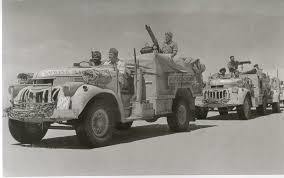
Patrol vehicles of the Long Range Desert Group
They fought behind the lines against Rommel and the German Afrika Korps. Their vehicles were civilian Chevy “hundredweights,” i.e. ton-and-a-half pickups. Into these they packed fuel, water, weapons, navigation gear, and spare parts. Their theater of war was the North African desert. In patrols of six to eleven trucks they routinely ventured a thousand miles from the nearest aid to work “beat-ups” on Axis airfields and to provide reconnaissance, transport, and intelligence to Gen. Wavell and later Gen. Montgomery and the British Eighth Army.
Their numbers were never more than 350, most of whom were New Zealanders and all of whom were volunteers.
In one call for recruits, eight hundred applied. The LRDG took twelve.
What, you may be wondering, does this have to do with the corona virus and the panicky pandemic times we find ourselves in right now?
The link is the mindset that these Kiwis (and, later, Rhodesians and Brits and others) brought to one of the most emotionally and psychologically challenging assignments any soldier could face.
But here’s what was fascinating to me about the selection process for the Long Range Desert Group:
The commanders did not want supermen. They weren’t looking for elite athletes who could do five hundred pushups or fire-breathing warriors with chests plastered with decorations for valor.
The ideal volunteer to face the loneliness and isolation of the desert was a working man, preferably a husband and father. Most LRDG selectees were older by ten years than the average front-line soldier. Many were farmers and stockmen. No few owned spreads of 10,000 acres and more.
The LRDG wanted men who were happiest with their hands dirty. They sought volunteers who could fix tractors and farm equipment, who had cared for sick livestock and dealt with drought and famine and flood. They wanted men who could grade roads and dig themselves out of ditches and downpours. Patience was a virtue prized more highly than martial valor. The type of individual the LRDG sought was a fellow who could work in close quarters with others under conditions of extreme stress, who did not flee from adversity but rather sought it out and throve on it.
The commanders wanted men with a sense of humor. Good mates in a pinch, as they phrased it.
That’s what you and I need right now.
We need the Kiwi virtues.
Nothing fancy. Nothing heroic. Just do our part and be there for our mates in trouble.
[For a visual glimpse of the Long Range Desert Group, here’s a video I did a few years ago to promote Killing Rommel: https://www.youtube.com/watch?v=zHjxQ...]
March 18, 2020
“Pandemic,” a Poem by Lynn Ungar
With special thanks to our good friend Joe Jansen, who sent me this poem, and to the website Science and Nonduality where it appeared … here is “Pandemic” by San Francisco poet Lynn Ungar, www.lynnungar.com.
Pandemic
What if you thought of it
as the Jews consider the Sabbath—
the most sacred of times?
Cease from travel.
Cease from buying and selling.
Give up, just for now,
on trying to make the world
different than it is.
Sing. Pray. Touch only those
to whom you commit your life.
Center down.
And when your body has become still,
reach out with your heart.
Know that we are connected
in ways that are terrifying and beautiful.
(You could hardly deny it now.)
Know that our lives
are in one another’s hands.
(Surely, that has come clear.)
Do not reach out your hands.
Reach out your heart.
Reach out your words.
Reach out all the tendrils
of compassion that move, invisibly,
where we cannot touch.
Promise this world your love–
for better or for worse,
in sickness and in health,
so long as we all shall live.
Thank you, Lynn! Some pretty good thoughts, I think, for those of us whose work is interior to begin with. Don’t get too crazy and keep doing what you do.
And keep washin’ yer hands!



